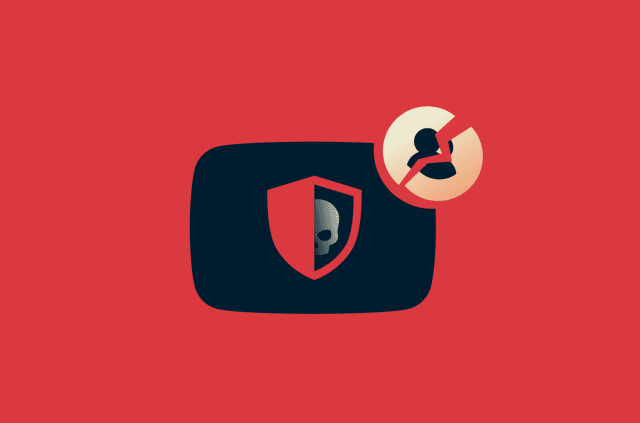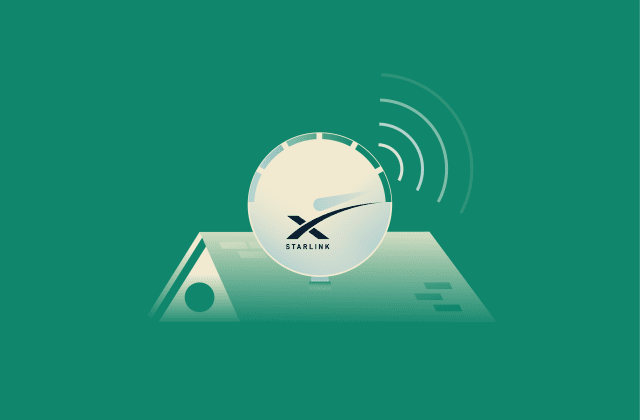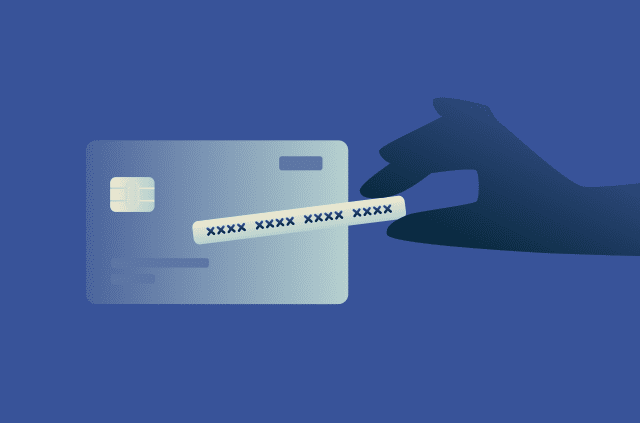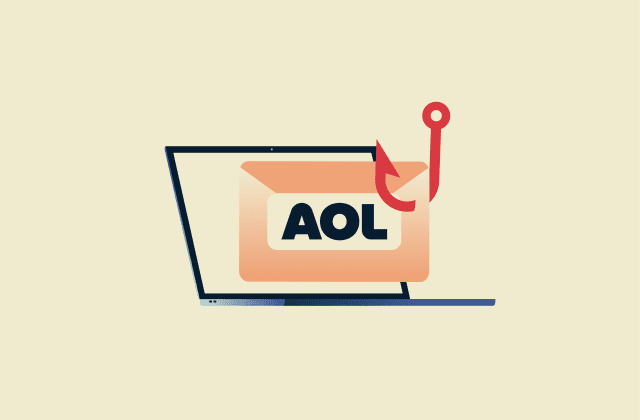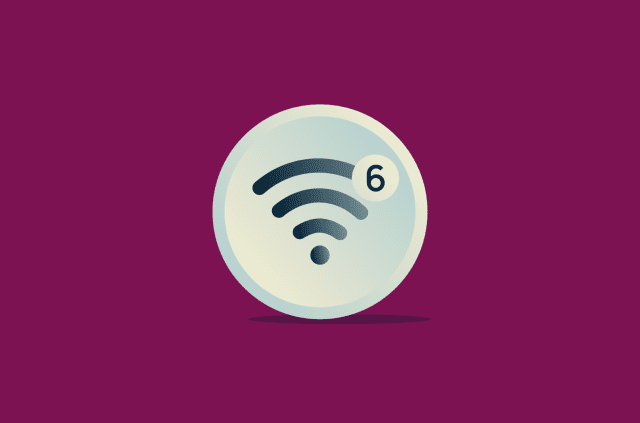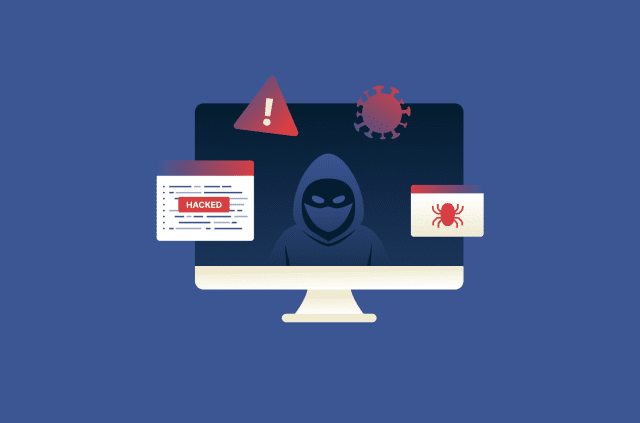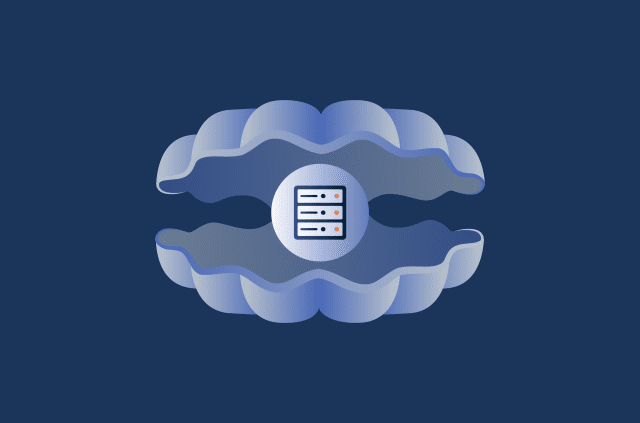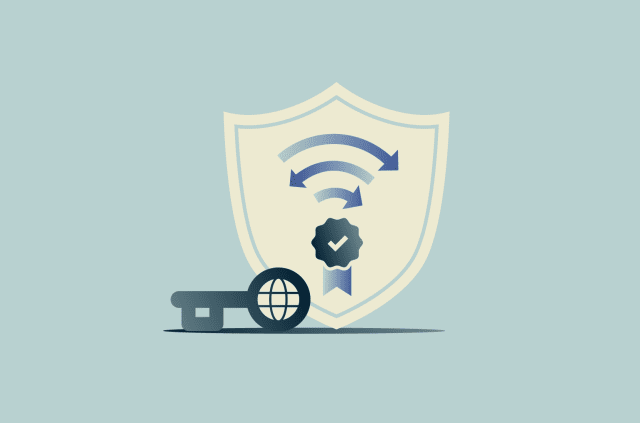VoIP VPN: Complete guide to securing your internet calls
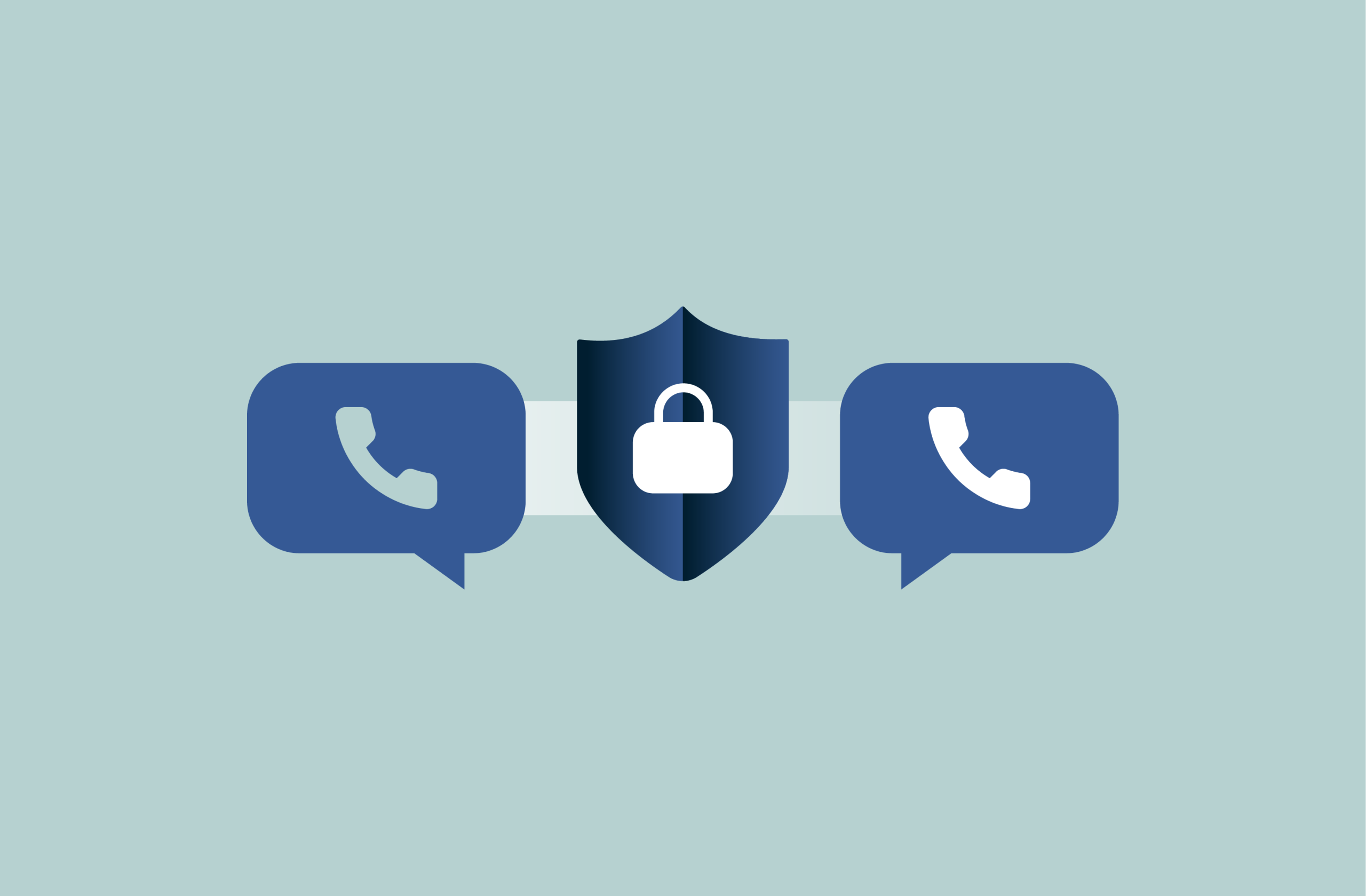
When you make a voice or video call online, it doesn’t travel straight to your contact. It passes through networks, servers, and internet service providers (ISPs) along the way, each a potential point where your data could be exposed or your connection disrupted.
This guide explains how a virtual private network (VPN) strengthens your Voice over Internet Protocol (VoIP) calls by encrypting your connection, protecting your privacy, and keeping your conversations secure.
Quick guide: How to use a VoIP VPN in 3 steps
- Sign up for ExpressVPN.
- Download the VPN app and connect to the server location of your choice.
- Log into your VoIP app and make a call.
Note: Use VoIP VPNs responsibly and in accordance with local laws and service policies. VPNs are legal in most countries, but some regions restrict or regulate their use, as they may also do with VoIP services. Always check local regulations before connecting, especially when traveling. ExpressVPN does not encourage violating any laws or terms of service.
What is a VoIP VPN
A VoIP VPN simply means using a VPN while making or receiving calls via a VoIP app.
VoIP lets you place calls using the internet instead of traditional phone lines. It’s the foundation behind most modern communication apps, such as Zoom, WhatsApp, Signal, and Discord.
A VPN encrypts the traffic between your device and the VPN server you connect to and masks your public IP so sites and apps can’t see it.. When combined, the two technologies work on different layers of your connection:
- VoIP encryption protects the content of your call (what you say and hear).
- VPN encryption protects your internet traffic as a whole, concealing information such as your IP address, location, and which service you’re connecting to.
So, a VPN doesn’t replace VoIP encryption but adds an additional privacy layer on top of it. This distinction becomes clear once we look at who can see what during an online call.
How VoIP encryption works
To understand where a VPN fits in, it helps to know how VoIP encryption works. Most VoIP services secure calls at two main levels: transport encryption and end-to-end encryption (E2EE).
Transport encryption protects data as it travels between your device and the VoIP provider’s servers. Today’s industry standard for this is a combination of Session Initiation Protocol over Transport Layer Security (SIP-TLS) and Secure Real-Time Transport Protocol (SRTP).
- SIP-TLS: Encrypts the signaling stage of a call, which handles dialing, authentication, and call setup. This ensures personal data like usernames, credentials, and phone numbers are protected from interception during setup.
- SRTP: Encrypts the actual audio and video streams once the call is active, using the Advanced Encryption Standard (AES) to keep your voice data private.
However, these protocols are managed by the VoIP provider, meaning it still controls the encryption keys. In practice, this stops outsiders from eavesdropping but doesn’t necessarily stop the provider itself (or anyone with access to its systems) from inspecting call contents.
Learn more: Find out more about encryption protocols and how they work.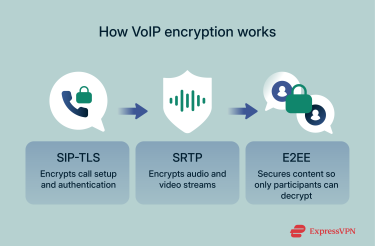
End-to-end encryption (E2EE)
E2EE takes this further. Only the devices in the conversation hold the encryption keys, so not even the VoIP provider can decrypt the data. Popular examples include:
- Signal and WhatsApp: These apps use the Signal protocol (which is open source and maintained by Signal) to secure voice, video, and messaging.
- Discord: It has begun rolling out its DAVE framework to add E2EE for voice and video.
E2EE protects message content, but it doesn’t hide metadata, such as who you contacted, when, and for how long.
For instance, WhatsApp fully encrypts your call and message content but still collects a broad range of metadata, including how often you use the app, and when you’re online or last seen. Such metadata can be shared with law enforcement if there’s a valid legal request.
Signal, by contrast, was built with metadata minimization in mind. It retains only the date you registered and the last time you connected; no contact lists, group data, or message logs.
Learn more: Check out our detailed guide on Signal vs. WhatsApp to see which app offers better privacy.
What a VPN protects you from (what outsiders can see)
A VPN doesn’t change what your VoIP provider can see. It won’t prevent the provider from collecting metadata or accessing unencrypted audio if E2EE isn’t used. What a VPN does is secure the rest of your connection, shielding your IP address, location, and overall VoIP activity from outsiders on the network.
Without a VPN, third parties can typically determine:
- Which VoIP service you’re using, based on destination IPs or Domain Name System (DNS) requests
- When your call starts and ends
- Roughly how long the call lasts
- The approximate amount of bandwidth consumed
They can’t necessarily hear your call (if SRTP or E2EE is used), but they can still gather metadata that may reveal your habits, location, or network identifiers.
A VPN addresses this by encrypting all your device’s internet traffic and routing it through a secure tunnel. The result is:
- VoIP packets are indistinguishable from any other encrypted VPN data.
- Your ISP only sees a connection to the VPN server, not which app you’re using or who you’re calling.
This helps prevent third-party tracking, profiling, and potential interference like traffic shaping or throttling. ISPs sometimes deprioritize high-bandwidth activities (video calls, streaming), and a VPN can make such traffic harder to classify.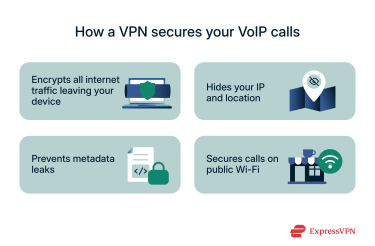
Risks of unprotected VoIP connections
VoIP technology has matured, but unprotected setups still expose you to serious security and privacy risks. These range from simple misconfigurations to deliberate attacks that exploit unencrypted or poorly secured connections:
- Eavesdropping on unencrypted calls: If a VoIP app doesn’t implement SRTP or E2EE, attackers on the same network can intercept the unsecured Real-Time Transfer Protocol (RTP) packets and reconstruct audio.
- Metadata leakage: Even when call content is encrypted, unprotected signaling (for example, SIP without TLS) can reveal the caller's and callee's phone numbers and device information.
- Peer IP exposure: Peer-to-peer (P2P) connections may reveal your IP address to other participants, exposing your approximate location or potential attack surface.
- Man-in-the-middle (MITM) attacks: On unsecured Wi-Fi networks, attackers can intercept or modify unencrypted SIP or RTP traffic, block messages, or drop calls.
Why use a VoIP VPN?
Protecting voice data and call privacy
As discussed earlier, VoIP encryption protects the content of your call, while a VPN secures the connection around it. It helps mitigate metadata leaks, peer IP exposure, MITM attacks, and adds a fallback layer of encryption to the network channel.
Reducing throttling and connection drops
One big benefit isn’t even related to online security. ISPs can sometimes throttle speeds during peak hours if they detect bandwidth-heavy activity, such as long VoIP video calls, streaming, or gaming. This can cause the feed to suddenly drop in quality, making it hard to hear what’s being spoken or see the people you’re talking to through all the pixelation.
VPN encryption conceals the traffic type and can also reroute your connection through less congested networks, helping to stabilize performance; however, latency may vary depending on the distance to the VPN server. Please also note that a VPN can’t prevent throttling or limits that come directly from your mobile data plan.
Learn more: Read our complete guide on how to increase bandwidth when using a VPN.
Staying connected while traveling
When traveling, you might notice that some networks or regions handle VoIP services differently, which can affect the quality or availability of your calls. Using a VPN can help you stay connected to your usual communication apps by keeping your connection private and secure on public or unfamiliar networks.
It also helps protect your data from snooping on hotel Wi-Fi or shared internet connections. However, always check local laws before using a VPN for VoIP, as its use may be restricted in some locations.
Potential disadvantages of using a VoIP VPN
While a VPN improves privacy and call security, it can introduce a few trade-offs to be aware of:
- Slight latency increase: Routing traffic through a VPN server adds distance, which can cause a small delay or ping increase.
- Potential speed overhead: Encryption requires processing power and bandwidth, which might slightly affect call quality on slower networks.
- Connection interruptions: If the VPN disconnects, a kill switch temporarily blocks traffic until protection is restored. This keeps data private but can interrupt the call.
These effects are usually minimal, especially when using nearby VPN servers and modern, low-latency protocols like Lightway or WireGuard.
How does a VoIP VPN work?
A VoIP VPN doesn’t change how your call app works; it changes how your data travels across the internet. Instead of sending packets directly through your ISP, the VPN creates a secure tunnel that wraps every bit of data, including VoIP packets, in encryption before it leaves your device.
When you connect to a VPN, it applies two layers of protection:
- Encryption: Your entire internet session, including VoIP data packets, is scrambled with strong algorithms (such as 256-bit AES). Anyone intercepting the packets sees only unreadable code.
- Tunneling protocols: These define how encrypted data moves between your device and the VPN server. Modern protocols like Lightway, WireGuard, IKEv2/IPSec, or OpenVPN (UDP) prioritize low latency, which is ideal for real-time audio and video.
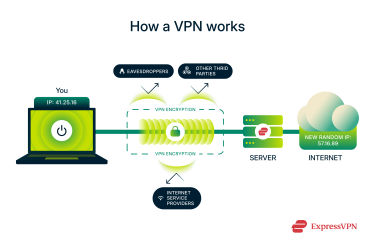
Learn more: Read our detailed explainer on VPN protocols.
VoIP VPN setup basics
Using a VoIP VPN doesn’t require any special configuration inside your VoIP app. VPNs operate at the network layer, so once you’re connected, all internet traffic (including voice and video) is automatically tunneled.
Configuring on desktop and mobile
Here’s a simple setup process:
- Launch the VPN app on your device.
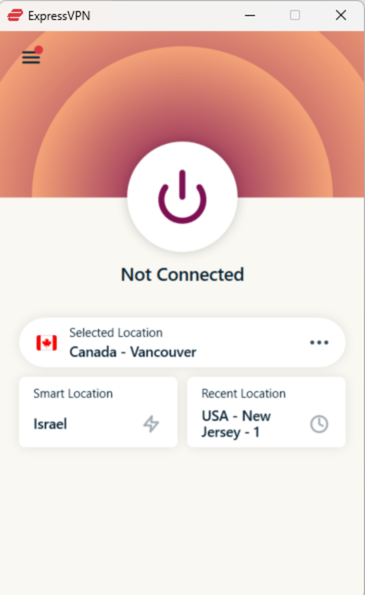
- Select a server location of your choice. It’s best to connect to a nearby server location to minimize latency.
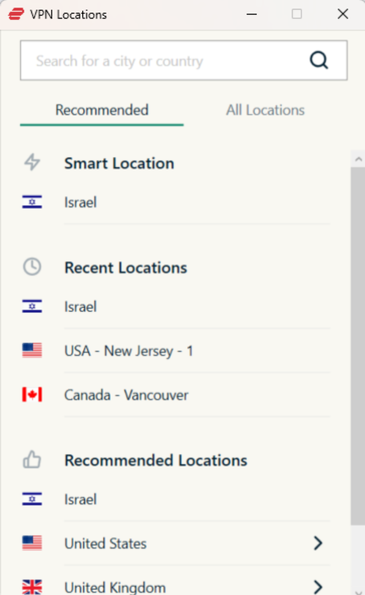
- Click the Connect button. Your internet traffic is now encrypted.
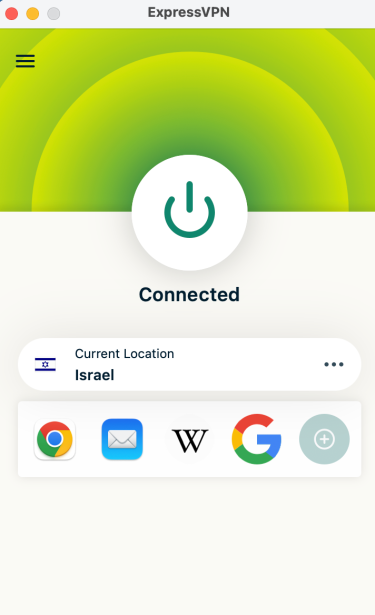
- Open the VoIP app and dial out or accept the call as you normally would. The call goes through the VPN automatically with no special tweaks needed.
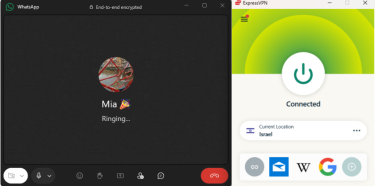
Testing your connection security
After setting up, it’s wise to verify that your VoIP calls are indeed going through the VPN securely.
- Check your IP address: Before and after connecting, use an IP lookup tool. Once you connect to the VPN, the IP will turn green and show your VPN server’s location.

- Run a WebRTC leak test: This confirms your real IP address isn’t exposed through browser-based VoIP tools.
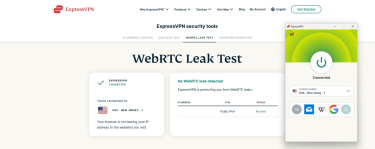
- Monitor the VPN connection: Watch your VPN status during calls. If the connection suddenly drops, ExpressVPN’s kill switch automatically blocks traffic until the VPN reconnects, preventing any data from leaking outside the tunnel.
Choosing a VoIP VPN
Not all VPNs work well with VoIP. Some slow down connections, interfere with call setup, or struggle to maintain stable audio and video quality. When comparing VPNs for VoIP, focus on a few essentials:
Speed and reliability
Because VoIP requires steady, low-latency connections, performance is key. ExpressVPN’s servers use 10Gbps connections (with many upgraded to 40Gbps), helping maintain clear audio and video even during busy network hours. Stable routing minimizes lag and audio cutouts, essential for group meetings or long calls.
No-log policy and data protection
A strong privacy foundation is just as important as speed. ExpressVPN follows a strict no-logs policy, meaning it doesn’t record your activity, connection timestamps, or call metadata. Its RAM-only servers (TrustedServer technology) automatically wipe all data with every reboot.
All traffic is secured with 256-bit AES encryption and private DNS on every server, keeping your voice and video data shielded from interception.
Server availability and split tunneling
A global network of servers helps minimize latency by letting you connect to one near you or near your call destination. The shorter the distance, the smoother the call.
Split tunneling adds flexibility. You can choose which apps use the VPN and which use your regular internet connection. For example, route your VoIP app through the VPN for privacy while keeping streaming or local banking apps on your regular connection for better performance or access.
Learn more: Found out what the difference is between split tunneling and full tunneling, and which one you should use.
Common issues and troubleshooting
Before contacting your VoIP or VPN provider's customer support, here are some of the most common issues you might encounter and easy steps to resolve them. If you experience audio delay, distortion, or dropped calls while using a VPN:
- Switch servers or locations: The VPN server might be overloaded or too far away. Try switching to one that’s geographically closer to you or less congested to improve performance.
- Choose faster protocols: Choose a UDP-based VPN protocol such as Lightway, WireGuard, IKEv2, or OpenVPN (UDP) for lower latency.
- Check your base connection: Run a speed test with and without the VPN. If your internet is slow without it, the problem is with your network, not the VPN. Contact your ISP if necessary.
- Limit competing traffic: Pause large downloads or streaming on other devices during calls, as shared bandwidth is one of the most common causes of lag.
- Test a different VoIP app: Make a short test call using another service. If performance improves, the issue may be with your VoIP provider rather than your VPN.
- Update your VPN app: New versions often include stability and compatibility fixes.
- Check your internet connection: If your ISP connection fluctuates, your VPN connection might drop.
FAQ: Common questions about VoIP VPNs
Is it legal to use a VPN for VoIP services?
VPNs are legal in most countries, and so are Voice over Internet Protocol (VoIP) services. Some VoIP providers may restrict or prohibit VPN use, and violating their terms can result in account suspension.
Always review the provider’s terms of service and follow the laws and regulations applicable in your jurisdiction.
Can a VPN improve VoIP call quality?
A VPN typically won’t improve the quality of the call, because encryption adds latency. But if your internet service provider (ISP) throttles Voice over Internet Protocol (VoIP) traffic, a VPN can help by hiding the nature of your connection.
Does ExpressVPN support VoIP?
Yes, ExpressVPN secures devices at the network level. So if you have a Voice over Internet Protocol (VoIP) app installed on your phone or computer, it will automatically be secured in the encrypted tunnel.
What should I consider before choosing a VoIP VPN?
Speed is important when picking a VPN for Voice over Internet Protocol (VoIP) calls. A VPN that doesn’t have high-speed servers will lower the audio and video quality of your calls. Unlimited bandwidth is another important factor, as you don’t want a call to cut out in the middle because you reached your data limits. Finally, look for strong security to encrypt the data surrounding the call and prevent third parties from tracking the call back to you.
Take the first step to protect yourself online. Try ExpressVPN risk-free.
Get ExpressVPN



